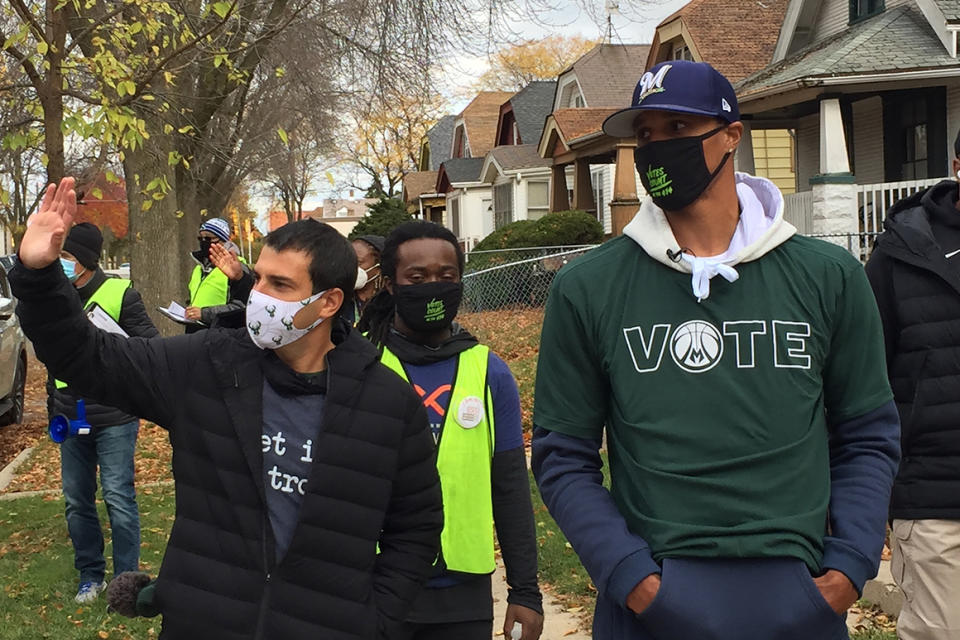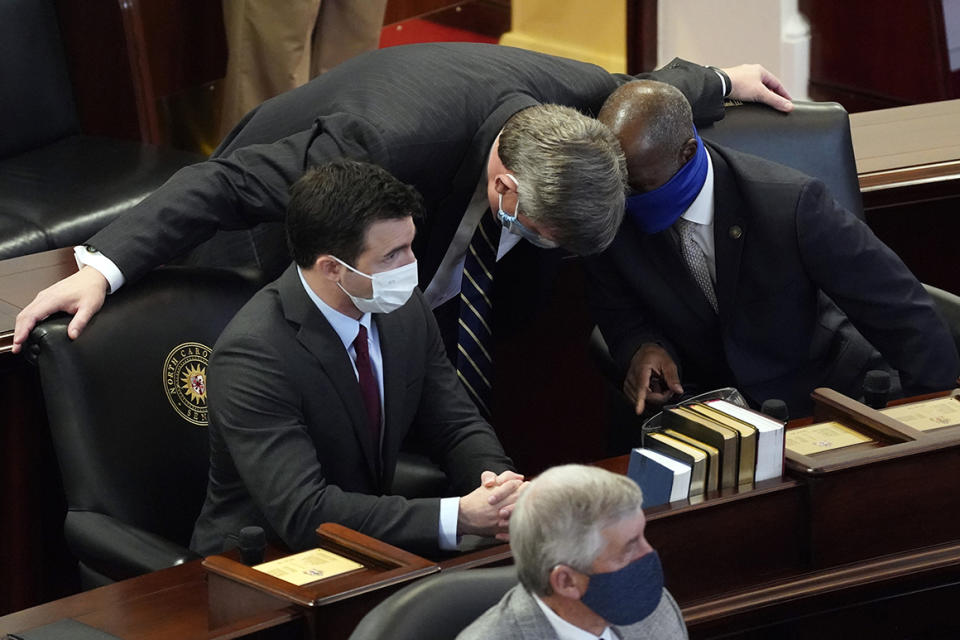Early crowd of candidates pack Democratic Senate primaries
Democratic candidates are already leaping into the top Senate races that will be on the ballot next year, heralding a year of expensive, competitive primaries about the future direction of the party.
Less than two months after Democrats took control of the Senate, a half-dozen candidates in top battleground states have already started campaigns to grow the majority. Two candidates are officially running in each of the party’s top targets of Wisconsin, Pennsylvania and North Carolina, and plenty of others are seriously considering bids or actively gearing up to run.
The early dynamic — driven by the belief that the old D.C. model of who runs for Senate has changed — means Democrats will not be wanting for candidates in next year’s most important states. But it also demonstrates there are not runaway Democratic frontrunners in those 2022 states, the way there were in many recent Senate battlegrounds. And it means there’s a strong likelihood the party will face competitive nomination fights next year.
So far, the Democratic Senatorial Campaign Committee has indicated it will adopt a wait-and-see approach to primaries at this early stage, according to four consultants and operatives familiar with the dynamics, all of spoke on the condition of anonymity to detail conversations with candidates and party leaders. DSCC leaders have not outright promised not to endorse or back candidates, according to these people, and there is no blanket strategy when it comes to engaging in primaries — which the DSCC has done freely in recent elections.
But Democratic operatives and advisers are under the impression that candidates will be left to fight out primaries in these states in the months to come, potentially all the way to the nominations.
“All signs in Pennsylvania, Wisconsin, North Carolina point to very active primaries of the likes the committee has almost completely been able to avoid until now,” said one veteran operative involved in Senate races.
The Senate hopefuls are reaping new advantages of jumping into a race early, according to conversations with a dozen candidates, advisers and party operatives. Candidates who kicked off now can get media attention before the field gets too crowded and get more time to scale up small-dollar fundraising. And they’re doing it publicly, rather than jockeying behind the scenes for position in an “invisible primary” before deciding whether or not to run. It’s likely that even more candidates will declare in April, once the second fundraising quarter kicks off.
“The one thing you don't get back in a campaign is time,” said Tom Nelson, the county executive in Outagamie County, Wis., who launched his Senate bid last fall — before Election Day 2020. “Those are successful campaigns, people that get in because they know the reason why they want to get in, they don't need to be coaxed into doing it, they don't dilly-dally — 'should I get in now or should I wait later?' You're in, and you work as hard as you can, 18-hour days, and do it for 24 months."
Last week, Milwaukee Bucks executive Alex Lasry launched his campaign with endorsements from several local Milwaukee officials, joining Nelson in the race. And Sarah Godlewski, the state treasurer who won her first statewide election in 2018, is “seriously considering” a campaign and will make a final decision in the spring, according to a spokesman.
Wisconsin is one of the Democratic Party’s top Senate targets, but similar dynamics are playing out in Pennsylvania and North Carolina, and also in Ohio, where multiple Democrats are eying open seats vacated by retiring Republicans. (Several GOP candidates have already jumped in, too.)

Lasry, 33, said he got into the Wisconsin race early because it was “probably the most important Senate election in the country” and said he’d bring a “fresh perspective.” He highlighted the $15 minimum wage and commitment to union jobs through the NBA franchise as two examples of his approach. He said he would invest his own money in the race, but also planned to build a campaign focused on the grassroots.
“The best campaigns I’ve seen, and the most successful ones, are the ones where you're building from the bottom up, building a real grassroots effort and bringing as many people in that type of coalition to the fold,” Lasry said.
It is not a surprise the DSCC isn’t picking candidates already, especially considering that the committee’s turnover from the 2020 election was delayed by Georgia’s runoffs, which ran into January. The DSCC’s first endorsement in 2019 was in April, backing now-Sen. Mark Kelly in Arizona, who launched in mid-February — and that was unusually early. But the committee ultimately backed a candidate in nearly every battleground race across the country last year, sometimes endorsing immediately — in Maine and Iowa — and sometimes months into primaries, as in Texas and North Carolina.
Now, some operatives say they think the committee is taking a different approach to the upcoming election and the influx of potentially viable candidates.
“They're fundamentally not operating in the way they did in this period in 2019,” said one Democratic consultant who works on Senate races. “They are far more hands-off already than they were at this point in 2019, that is very clearly the case.”

Stewart Boss, a spokesperson for the DSCC, said in a statement that the committee would do what was needed to defend the majority.
“It’s early in the cycle, but we will do whatever it takes to protect and grow our majority,” Boss said. “Every race is unique, and the DSCC will work carefully to ensure Democrats have strong nominees and the campaign infrastructure to win in 2022.”
Some Democrats see more primaries as a good thing for the party. One consultant working on Senate races said it’s good to “make candidates work for it.” Potential candidates range from experienced statewide winners to local elected officials and those running their first campaigns.
“If you're not willing to muscle your way through a primary, you don't deserve to be the nominee,” this consultant said.
Republicans face looming primary fights of their own in the open seats where senators are retiring, races that could become similarly crowded and expensive. But they’re already reveling in the Democratic primaries that are developing.
“It's going to be easier for Republicans to get Democratic candidates to actually take positions on a lot of controversial, far-left, progressive priorities that in the past some of their candidates have basically just refused to answer because they didn't have a primary to answer for,” said Jack Pandol, spokesman for Senate Leadership Fund, the GOP super PAC.
In Pennsylvania, Lt. Gov. John Fetterman was the first to launch his campaign after raising seven figures during an exploratory phase earlier this year. An underdog small-town mayor running against a DSCC-endorsed candidate last time, Fetterman is running from a much more formidable position this time around. Malcolm Kenyatta, a 30-year-old state representative from Philadelphia, launched a bid last week, and several members of Congress and municipal officials could join them in the race.
“This is not owed to me and it's not owed to anybody in this race,” Kenyatta told reporters after launching his campaign. “We have to build a big coalition to get stuff done and I'm going to be focused on building a big coalition. Who is going to support who when, I don't know, and that's not something frankly I'm going to be spending a lot of time focusing on.”
In North Carolina, Democrats are already bracing for a primary after recriminations over the party's loss in 2020. State Sen. Jeff Jackson announced his campaign in January, former state Sen. Erica Smith is running again after losing the 2020 primary, and others, including former state Supreme Court Chief Justice Cheri Beasley and state Sen. Sydney Batch, could run as well.
“We're a big state and doing this right means investing a lot of time on the front end listening and learning,” Jackson said of his early launch, saying he'd already done events in four counties. “Whether this primary is crowded or empty, we're still running a 100-county campaign. The idea is to use the campaign not just as a gigantic marketing effort but as preparation for the job itself, and that doesn't change based on who else is running."

